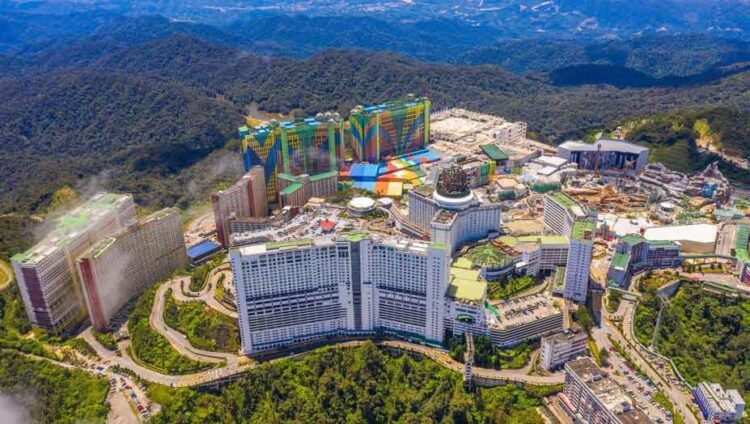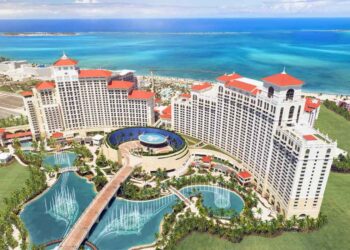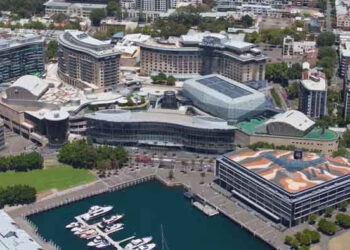Many IAG readers have asked for an in-depth analysis of Genting’s chances of being successful in their bid for a Macau casino concession and the implications for Macau of a Genting win. In this two-part article, published yesterday and today, IAG conducts an in-depth examination of Genting’s bid.
Part one of this article, published yesterday, ended with a range of “How?” questions regarding Genting’s concession bid in Macau.
Let’s start with, “How would Genting finance a Genting Macau?” It’s beyond the scope of this article to break the numbers down, but after examining the balance sheet of Genting Malaysia, and factoring in some generous estimates on likely EBITDA of a Genting Macau over an assumed 10 years for the upcoming concession period, and applying a forgiving leverage ratio, and assuming Genting could raise finance based on future Macau earnings (in a market where the incumbents are losing money hand over fist), finance experts IAG consulted for this story estimated a combined “Genting Malaysia Macau” had the ability to raise around US$2.5 billion to finance their bid.
That would wipe out all the borrowing capacity of Genting Malaysia, a company that is currently bidding for a downstate license in New York, which would likely need around US$1 billion to US$1.5 billion to finance.
Is US$2.5 billion enough money for a Genting Macau? Probably not. Over the past 20 years each of the incumbent concessionaires have spent an average of around US$7 billion on at least two IRs apiece. Even the smallest of the six spent just under US$5 billion on construction costs. We’re not privy to the numbers being talked about in the current negotiations with the Macau government, but we do know from recent media reports the government is asking the concessionaires to increase their investment commitments substantially, perhaps by orders of magnitude. This was described by Eilo Wing-Yat Yu, Associate Professor of the Department of Government and Public Administration of the University of Macau, as “out of touch with reality.”
It’s possible US$2.5 billion from Genting may not even match a lowball bid from one of the smaller incumbent concessionaires. And surely for a newcomer to usurp an incumbent, the newcomer’s offering would have to not just equal the incumbent’s – but be substantially better?
The other consideration here is that 10 years is not really 10 years. Much as I hate to say it, it’s clear from what we’re seeing in Beijing right now that mainland China’s COVID-zero policy is here to stay. It might be another two or three years before Macau concessionaires start booking serious profits, and when they do, the first thing they will have to do is cover the losses of the COVID years. The upcoming 10-year concession period might entail say two years losing, two years recovering, and just six years to make some real money. Or even just four. And don’t forget, the concession period is a maximum of 10 years. There is nothing stopping the government from granting even shorter periods, for example if it were dissatisfied with a concessionaires’ final capital commitment offering.

There is no doubt Genting offers some advantages that may well be attractive to the Macau government. Firstly, they are not American, and they are not even western, so that ticks the “geopolitical tensions” box given the current state of play between China and the west. They also have a long and storied history in the cruise business (despite the Genting HK debacle), and this may tick the “maritime tourism” box the Macau government referred to in the tender documents. They also have theme park assets with Universal Studios at Singapore’s Resorts World Sentosa and the newly opened SkyWorlds theme park at Genting Highlands. “Themed tourism” was another of the items mentioned by the Macau government in its tender requirements.
But there are downsides to Genting too, aside from the finance question discussed above. Most importantly, there is a big question mark around whether Genting can operate effectively in a hyper-competitive environment. Such competitive markets like Macau and Las Vegas are completely different kettles of fish to monopolies like Genting’s operation in Malaysia or even the Singapore duopoly. Genting has spent most of its history simply enjoying the monopoly that came with operating the only legal casino in Malaysia. There was a six-year foray in Burswood (now Crown Perth) as a founding shareholder from 1984 to 1990, but that was (and still is) a monopoly property too – the only casino in Western Australia.

In fact, the Genting Highlands property about an hour’s drive north of Kuala Lumpur was one of the first major casinos in Asia, and in its early days saw almost no competition from across the entire continent. As a result, the “monopoly mindset” is firmly entrenched in Genting’s DNA. For most of its existence, Genting was best served by focussing on government relations and staying under the radar of public attention, given its nature as a casino operator in a Muslim-majority country, instead of prioritizing the improvement of its service delivery standards or focussing on building a better mousetrap.
When Genting eventually expanded to duopoly marketplace Singapore, their sole competitor, Marina Bay Sands (MBS), trounced them. Genting have consistently underperformed compared to their Singapore rival, with MBS usually capturing around two-thirds of the market compared to Genting’s one-third. Arguably, this should have been the other way around, given Genting’s decades-long head start in Malaysia, a country with strong cultural, geographical and historical links to Singapore.
And what about Genting’s performance in Las Vegas? This is arguably the best bellwether for how they might perform in Macau, given the competitive hotbed that is Las Vegas and the recency of Genting’s launch there on 24 June last year.

Resorts World Las Vegas (RWLV) cost around US$4.3 billion to construct, the most expensive IR ever built in the city. The property is in a prime Strip location, formerly occupied by the iconic Stardust. But RWLV returned an EBITDA of just US$37 million in Q2 (Q3 numbers are not yet available), an annual run rate of just US$148 million, well shy of the US$250 million analysts were estimating, and representing an EBITDA ROI of just 3.4% per annum. Nomura analysts Tushar Mohata and Alpa Aggarwal noted, “We feel that the absolute EBITDA is still below expectations, especially as we estimate RWLV also has quarterly interest of US$25 million and depreciation charges of US$60 million, which will drag EBITDA into deep losses at the net income level.”
Notably, this low return coincided with around 90% hotel occupancy, indicating the hotel Average Daily Rate (ADR) was very low compared to its peers, a proven poor strategy for luxury IRs. Low ADRs may fill hotels, but with the wrong sort of people – those who don’t play much (or at all) in the casino and who don’t spend in the high-end restaurants. Even worse, these results have occurred during the biggest boom time Las Vegas has ever seen. As mentioned in part 1 of this article, the city enjoyed an all-time record-breaking GGR of US$9.3 billion for the fiscal year to June 2022.
Genting has interests in the UK and the Bahamas, and has had other international forays, such as their financing of Foxwoods back in the 1990s, and a technical and management services agreement with The Adelaide Casino for around a decade in the 1980s and 1990s. They also operate Resorts World New York, a slot and ETG-only casino with no live dealers, and Resorts World Catskills in New York State via subsidiary Empire Resorts. But all of these are probably too small and/or different to what they would face in Macau to provide substantial insights.

Moving back to Macau, the question needs to be asked whether Genting has the stomach to play “the Macau game.” Can it take on 4,000 staff it doesn’t need and pay them MOP$20,000 to MOP$25,000 a month each for doing next to nothing, as some of the other Macau concessionaires have been doing for nearly three years now? Can it reach into its pocket and fork over money to the Macau government every time the government “suggests” the concessionaires sponsor the latest government project or initiative? Does it realize these kinds of requirements, which would be considered ludicrous in most other places in the world, are standard operating procedure in Macau? This would all be new territory for Genting.
And what of the dreaded issue of reversion? How would that work? Let’s for a moment assume Genting wins a concession. Does it build on new land, maybe the never-developed parcel 7 and 8? If so, what would become of the casino of the losing concessionaire, which would revert to the government? Or does Genting take over the casino floor of the losing concessionaire, surrounded by the non-gaming assets of its former rival, the very company it took the concession from? And how would that work? How would the Macau government handle the disruption and try to bring the two companies together – one of which would no doubt be aggrieved?
The disruption wouldn’t just be a bricks and mortar issue. Think of the labor issues. All the local Macau gaming employees of the former concessionaire would likely instantly lose their jobs, as their employer would no longer have any incentive to “play nice,” having lost their coveted concession. There’s no guarantee Genting would hire all those out-of-work employees or continue their previous salaries and benefits.
How would the international investment markets react? Would Macau become even less investible than it already is? The investment community would see the Macau government ejecting an existing concessionaire – a company which invested billions over the previous two decades, employed thousands of Macau locals and did everything that was asked of it, and more. What would this do to investor confidence?

This raises a final point worthy of mention. This may be old fashioned, but what of the simple concept of loyalty? Yes, loyalty. Casting back 20 years, the first Chief Executive of Macau, Edmund Ho, had a vision. While the incumbent sextet of concessionaires have certainly made their fair share of mistakes and missteps, as a whole they have largely delivered on Edmund Ho’s vision. Indeed, the Macau government’s own “mid-term” review of the casino industry released in May 2016 found the Macau concessionaires had “fulfilled all the capital commitments in their contracts” and that the gaming industry had “obviously created positive impact on the economy and society of Macau.”
All six concessionaires have been instrumental in taking Macau from what some described as a “sleepy little fishing village” to a city with, pre-covid, a booming economy and the second highest GDP per capita in the world. There is an argument that that success must be recognized and rewarded, not punished.
All of this is not to argue that Genting shouldn’t be awarded a concession. Genting is a serious IR company with a long history, and they do offer some fresh new possibilities for Macau. Their bid should be carefully considered. But the Macau government would be well advised to consider all the consequences – positive, negative, intended and unintended – that a successful Genting bid would bring.


























